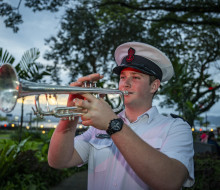
Taupō trumpeter in demand in brand new career with Royal New Zealand Navy Band
26 August 2025
Unfortunately you are viewing this website on an outdated browser which does not support the necessary features for us to provide an adequate experience. Please switch to a modern browser such as latest version of Google Chrome, Mozilla Firefox, Apple Safari or Microsoft Edge.
Ngā mihi nui
Staff Sergeant TJ Chapman passes on his weaponry knowledge while learning about Fijian culture and ethos.
New Zealand Army School of Artillery weaponry instructor Staff Sergeant TJ Chapman was privileged to attend the Fijian Warrant Officers Course at the Force Training Group (FTG) in Nasinu, Fiji, earlier this year.
Working alongside his Fijian colleagues was not just of benefit to the Fijians, he says, but he also learned a lot about their culture and how they operate.
“Through the first six weeks of the 12-week course, I gained valuable insights into the operations of the Republic of Fiji Military Forces (RFMF), including their roles, responsibilities as well as their ethos and values. The RFMF has embraced a new leadership framework, known locally as the Veiliutaki framework. I was fortunate to be a part of a highly motivated cohort of senior non-commissioned officers (SNCOs) and officers, aiming to implement positive changes for the RFMF as a professional organization.
“Our training has included extensive drill practice on the parade ground, focusing on funeral and sword drills, with a primary emphasis on understanding the role of a Company Sergeant Major (CSM) in a company parade. Additionally, we engaged in theory lessons covering topics such as customs and traditions within the RFMF, roles and responsibilities as warrant officers, service writing, and the Army Training System.”
The last part of the course involved practical lessons, including Tactical Exercise Without Troops (TEWTs) and range shoots.
“It became apparent to me that collaboration between the New Zealand Army and the RFMF is paramount for fostering regional stability, and mutual understanding in the Pacific. By working together on engagements such as this, the NZ Army and RFMF can build strong relationships based on trust, cooperation, and shared experience.
“I am seeing for myself that exchanges between the NZ Army and RFMF enables the exchange of knowledge, skills, and best practices, benefiting both organizations in terms of professional development and operational effectiveness. Through joint training exercises, capacity-building initiatives, and personnel exchanges, the NZ Army and RFMF can learn from each other's experiences and perspectives, ultimately strengthening our ability to address common challenges.”
SSGT Chapman says he thoroughly enjoyed his experience in Fiji.
“Through this programme I have acquired new skills and insights that I am eager to implement in New Zealand. These skills will undoubtedly enhance the effectiveness of my subordinates and prepare them for their roles as future leaders. I highly recommend this course to others as it offers valuable perspectives on New Zealand and the broader South Pacific region. It has been an enriching journey that has broadened my understanding and equipped me with tools to contribute positively to the professional development of my team.”